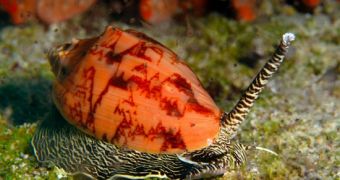Wildlife researchers are happy to announce that, thanks to an international ban concerning the use of an anti-fouling chemical known as tributyltin (TBT, for short), the world's sea snail population is finally putting a fairly odd condition behind it.
Specialists say that, about 20 years ago, when the hulls of boats and ships were still being treated with TBT in order to avoid or at least limit the accumulation of unwanted material, many female marine snails were found to develop a puzzling anatomical abnormality.
According to ABC Environment, this physical quirk boiled down to the fact that female marine snails ended up sporting male reproductive organs.
This peculiar condition was documented in several regions across the world, and it did not take scientists all that long to link it to exposure to TBT.
“It was all totally unexpected. Nobody in their wildest dreams would of imagined that such effects could occur and at such low concentrations, at nanograms per litre concentrations of TBT,” says specialist Dr. Peter Matthiessen.
The chemical was found to also cause the female marine snails to develop other particularities that had previously been documented in males alone, such as the presence of an anatomical system meant to carry seed.
Because of these quirks, the females found it impossible to deliver their eggs. “Really badly contaminated populations were wiped out because the females effectively exploded because they couldn't shed their eggs,” Dr. Peter Matthiessen details.
It goes without saying that having females belonging to one species grow male reproductive organs is nothing if not likely to affect the overall headcount for the species in question.
Hence, snail populations were found to decline in almost all of the areas where females had been affected by exposure to said anti-fouling chemical.
The areas hit the hardest were those where boating activity was fairly high. Interestingly enough, the chemical appeared to also keep oysters from growing to their usual size.
Besides, several other marine creatures, i.e. crustaceans, sea squirts and many invertebrates, experienced a drop in their population after being exposed to it.
The good news is that, ever since the use of TBT was banned on an international scale back in 2008, the number of cases of female marine snails affected by this condition has considerably declined.
What's more, specialists say that there are certain regions where the abnormality has altogether disappeared, the same source tells us.
As Dr. Peter Matthiessen explains, “To a large extent we are seeing good recovery. In areas where the populations were wiped out we are now beginning to see slow recovery since the complete ban kicked in in 2008.”
“It shows ecosystems have amazing abilities to recover from toxic insults. It is quite optimistic really,” he adds.

 14 DAY TRIAL //
14 DAY TRIAL //